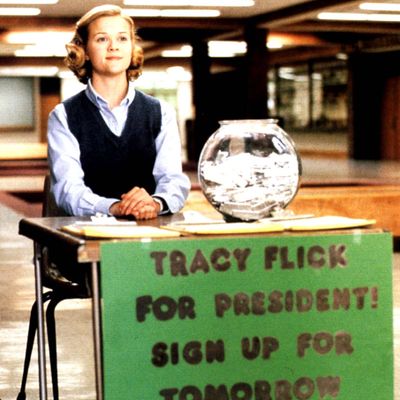
It’s hard to think of a role that’s a better fit for Reese Witherspoon than Madeline Martha Mackenzie, the uptight type-A supermom at the heart of HBO’s Big Little Lies. Madeline, on her second marriage (to a bearded Adam Scott), is still obsessed with her first husband, played by James Tupper, and rages impotently against his New Agey new wife (Zoë Kravitz). She treats her daughters with all the affection of a Soviet gymnastics coach, and her singular goal currently, other than getting those daughters into good colleges, is to stage a community-theater production of Avenue Q. In the hands of a lesser actress, Madeline would amount to a pile of nonsense in yoga pants. As played by Witherspoon, she’s funny, intimidating, and when she reveals the cracks in her moisturized facade, a little tragic.
More to the point, with Witherspoon playing her, Madeline gets to be the center of the story — or near the center, as Nicole Kidman’s Celeste, who harbors dark secrets in her home life, plays the moon to Witherspoon’s abrasive sun. She’s playing a kind of character she’s perfected: the type-A maniac. Witherspoon can take characters broad enough to be bullies, villains, or jokes, and make them the most compelling thing onscreen.
Annette Hargrove, Cruel Intentions (1999)
With wide eyes and picture-book blonde hair, Witherspoon’s an easy choice to play an innocent ingenue, and in her early roles, that was mostly what she was stuck with. In Fear, for instance, she was a good girl with the bad judgment to hook up with Mark Wahlberg. But in Pleasantville, she found a role where she could add a dash of deviance, as she starts to corrupt a sitcom town with her nascent sexuality. In Cruel Intentions, the arc goes in reverse, as Witherspoon plays a virgin seduced by the scheming duo of Ryan Phillippe and Sarah Michelle Gellar. Neither film unlocks the full Reese potential, but once you have her in a car making faces, we’re onto something.
Tracy Flick, Election (1999)
Now we’re talking. In Tracy Flick, Witherspoon turned in a character so iconic she became nearly synonymous with Hillary Clinton, a high-school overachiever bent on winning a class election who’s sabotaged at every turn by Matthew Broderick. The film is mostly told from Broderick’s perspective, and so it tends to take the side of the so-called losers of the world over the well-prepared Flicks, but Witherspoon gets more than enough time to fill out Flick’s complexities — she’s solid ambition, sure, but there’s anger, doubt, and neediness seeping through the cracks.
Elle Woods, Legally Blonde (2001)
Elle Woods goes from being a college sorority sister to the top of her class at Harvard Law School, thanks to an intuitive logical savvy and some careful deployment of the color pink. Here, Witherspoon is at her most aspirational, though never without her signature superhuman energy levels. I personally remain offended that she didn’t win every acting award for her line delivery of “What, like it’s hard?”
Melanie Smooter, Sweet Home Alabama (2002)
Sweet Home Alabama is empirically not a good movie, especially as it starts to get treacly in the latter half, but the joy of watching Witherspoon play a big-time city fashion designer is hard to deny. Watching a movie like this, or Just Like Heaven, which decides that the traits that make Witherspoon most fascinating onscreen need to be tempered by the love of a good man, you understand why A-list stars gave up on rom-coms.
June Carter, Walk the Line (2005)
As June Carter, Witherspoon did everything she had to do to win an Oscar — she played a real person, she sang, she even threw beer bottles at Joaquin Phoenix. Like any music biopic, Walk the Line tends toward the treacly on the whole, but Witherspoon holds her own, turning June into a ray of pure sunshine without leaning away from her insecurities — in one scene she admits she couldn’t sing very well as a kid so she had to learn to be funny. And then, of course, there’s her delivery of “baby, baby, baby,” a strong contender for the best Reese meme out there.
An American Citizen, Dash-cam video (2013)
After Walk the Line, we get into shallow waters, type-A Reese-wise. In How Do You Know, Water for Elephants, and This Is War, she got stuck in boring love triangles. Mud marked the beginning of a career resurgence, but since that’s not the type of showcase we’re looking for, we’re going to have to resort to some real-life footage: Witherspoon’s now-infamous arrest video, which she gracefully apologized for on Good Morning America. The video crystallized a certain aspect of Witherspoon’s star persona — the reckless “hellcat” alter ego that Caity Weaver nicknamed Laura Jean in a piece at Gawker — that also bubbled up that time she danced to “I Will Survive” or told Cara “De-la-vig-ne” that “The most important thing in a name, for a girl, is that a man can whisper it in his pillow.”
Penny Kimball, Inherent Vice (2014)
David Fincher didn’t want Reese Witherspoon to star in Gone Girl, a film she produced, and honestly, David Fincher was wrong. But in the year 2014, at least we got to watch Witherspoon play Penny Kimball, a buttoned-up deputy D.A. who hooks up with Joaquin Phoenix in Inherent Vice. Witherspoon got more attention, and an Oscar nomination, for playing Cheryl Strayed in Wild, which came out before this film, but that was minor-key Reese, while Vice is closer to her classic persona. In Hot Pursuit, she reverted back to playing big, though the less said about that, the better.
Madeline Martha Mackenzie, Big Little Lies (2017)
We don’t need to reveal much more about Big Little Lies, except that Reese Witherspoon is rocking some great athleisure and having the time of her life.


